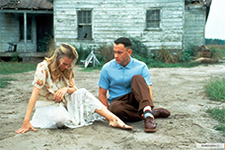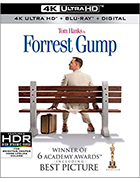Forrest Gump
|  Forrest Gump is one of those gloriously good-natured movies, the kind that views the world with such an open eye and optimistic attitude that you’re willing to overlook how much it simplifies complex phenomena just because it makes you feel so good. The movie covers a broad swath of 20th-century American history from the 1950s until the early 1980s as seen through the eyes of a simple man born and raised in Greenbow, Alabama, named Forrest Gump (Tom Hanks). Forrest ends up doing extraordinary things and being involved in just about every major historical event in his lifetime, from the rise of Elvis Presley, to the Vietnam war, to the Watergate scandal. Born with an IQ of only 75, Forrest Gump is, in his own words, “not a smart man,” but he has something much more important: fundamental human decency. Forrest always does the right thing because he is a decent person who genuinely cares about other people before himself. Tom Hanks won his second Oscar in two years playing Forrest (his first was for portraying a lawyer with AIDS in 1993’s Philadelphia), and it was a richly deserved award; his performance transcends what could have been a jokey, two-dimensional role and turned it into something utterly compelling. The movie’s seeming connection between low intelligence and innocence would be unsettling if it weren’t for Hanks’s ability to suggest that Forrest’s goodness comes from someplace deep inside his heart that is in no way connected to his ability to understand complex phenomena. The movie makes it clear that Forrest never fully comprehends everything that happens around him, yet that has little bearing on how he treats the people he loves. As he declares at one point in the movie, “I know what love is,” which is absolutely true. And this, the movie makes clear, is what really matters in the end. The narrative in Forrest Gump, which was radically expanded by screenwriter Eric Roth from the 1986 novel by Winston Groom, is epic in scope and circular in structure, taking Forrest from the backwaters of Alabama where he grew up in a boarding house run by his headstrong, wise, and loving Mama (Sally Field), through college where he gets a degree “after only five years of playing football,” to the battlefields of Vietnam, around the world as an international ping-pong champion, to the Mississippi coast where he becomes a shrimp boat captain, across the United States as he becomes a running legend, and then back to Alabama. Forrest’s fantastically good fortune becomes the movie’s structuring device, and it is hard not to imagine the narrative as a somewhat comical variation of the Biblical beatitude “Blessed are the meek.” Forrest’s journey through American history is juxtaposed against the journey taken by his childhood sweetheart, Jenny (Robin Wright), a beautiful and intelligent girl whose victimization at the hands of an alcoholic father sends her down a road populated by a series of abusive lovers, drugs, and discontent. Jenny and Forrest’s paths constantly cross throughout the years, yet their journeys are separate and distinct. Through the counterculture in the 1960s and eventually the cocaine-fueled disco scene of the 1970s, Jenny is the lost soul who never finds her footing until she is with Forrest, who turns out to be the rock. There are other characters along the way, as well. In Vietnam, Forrest becomes good friends with Bubba (Mykelti Williamson), who asks Forrest to be his partner in his family’s shrimping business when they get out of the war. It is also in Vietnam that Forrest meets Lieutenant Dan Taylor (Gary Sinise), who believes that it is his destiny to die on the battlefield. Lt. Dan spends many years afterward in drunken misery and bitter anger when Forrest saves him from death, but at the cost of his legs. The relationship between Forrest and Lt. Dan is one the movie’s most fascinating; it is much like Forrest’s relationship with Jenny, in that Forrest is the unwavering rock to which he can always anchor. Yet, Lt. Dan is ultimately the more interesting character because his problems are not so easily reducible to the aftermath of childhood abuse. Rather, he is a genuinely angry character whose bitterness is mostly of his own making because he put too much stock in what he believed to be his “destiny.” That he finally comes to peace with himself in the end is further testament to the movie’s optimistic outlook, that all will eventually be right in the world despite its seeming randomness. Much of the movie’s humor extends from Forrest’s voice-over narration, in which he unwittingly simplifies major historical events or sometimes gets them plain wrong (for instance, his description of the Ku Klux Klan is that they would dress up in bedsheets and ride around on their horses “acting like a bunch of ghosts or spooks or something”). Yet, at the same time, Forrest’s historical descriptions are sometimes presciently clear, especially when he speaks of the many historical figures—John F. Kennedy, Robert Kennedy, John Lennon—who were assassinated during his lifetime “for no particular reason.” In hindsight, some of the movie’s most celebrated sequences, those in which Tom Hanks was digitally combined with archival footage to give the impression that Forrest Gump was involved with such historical figures as George Wallace, John F. Kennedy, Lyndon B. Johnson, Richard Nixon, and John Lennon, don’t work all that well. These scenes often have an awkwardly inserted feel to them or, in the case of the scene in which Forrest drops his pants in front of Johnson to show him where he was shot in the rear end, just too jokey. The entire sequence near the end of the movie in which Forrest spends several years running across the United States has never worked very well, either—it feels more like filler than an episode of any real narrative importance. This sequence also has some of the movie’s more strained and unsuccessful attempts at humor, such as the suggestion that Forrest was unwittingly responsible for coining the bumper-sticker phrase “Shit happens” and creating the famous yellow smiley face. These are minor quibbles, though, as Forrest Gump is a real achievement in melding old-fashioned storytelling (it truly relies on the question “What will happen next?”) and the latest in computer-generated special effects. Politically speaking, it is one of the more conservative movies to emerge from Hollywood, with its celebration of the Protestant work ethic, nationalism, and old-fashioned values, along with its questioning attitude toward the counterculture, drug use, easy sexuality, and challenging the status quo. Yet, in an era marked by cynicism and irony, these attributes may have been exactly what people were hungry for and why the movie became such a smash hit. In hindsight, it is easy to see why Forrest Gump was so successful at the box office and why it became an instant cultural phenomenon: It is a completely original creation whose most striking quality is its ability to reassure us that everything happens for a reason, folk wisdom is the best kind of knowledge, no one ever dies in vain, and, most important, love will win in the end.
Copyright © 2018 James Kendrick Thoughts? E-mail James Kendrick All images copyright © Paramount Home Entertainment | |||||||||||||||||||||||||||||||
Overall Rating: 


 (3.5)
(3.5)


